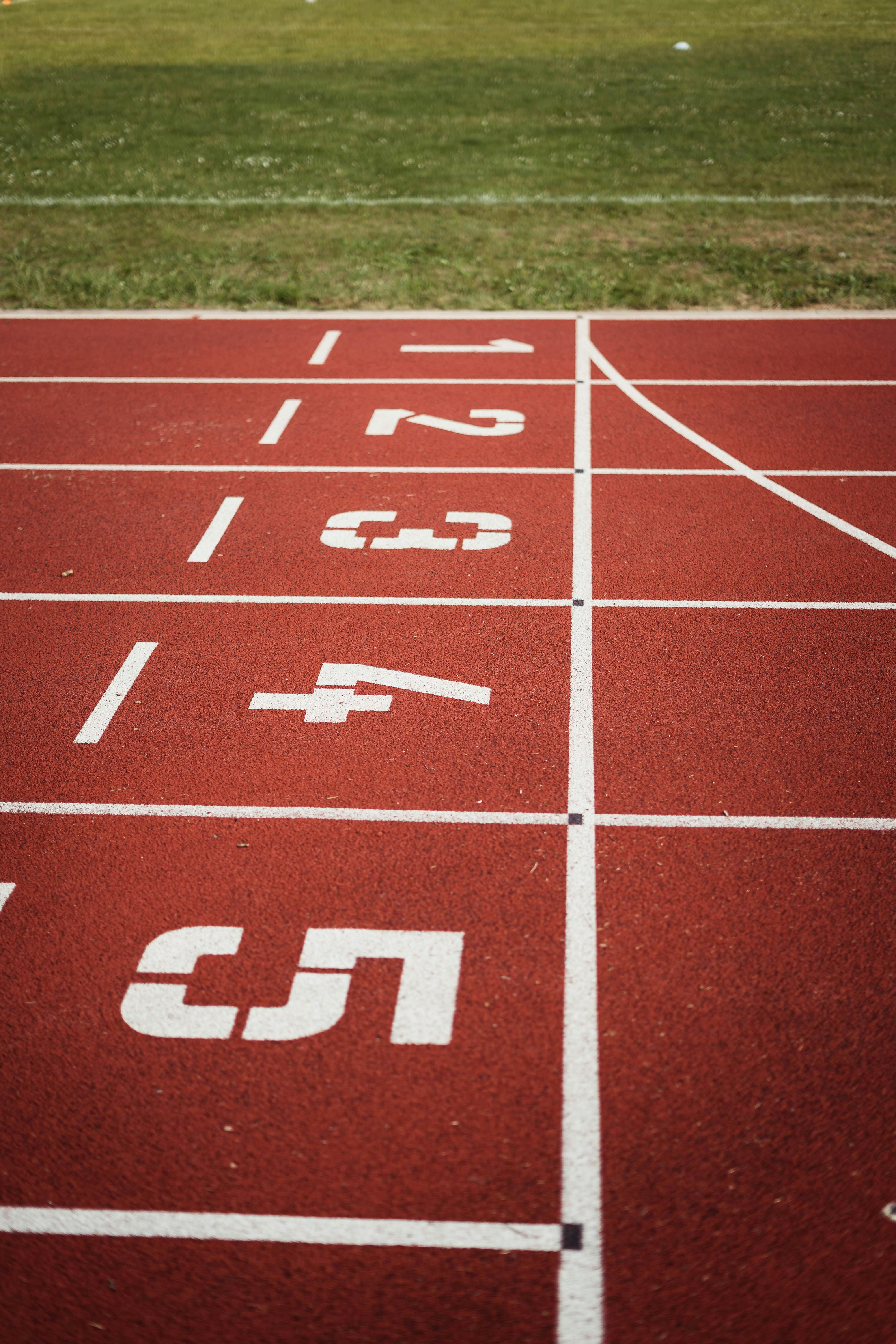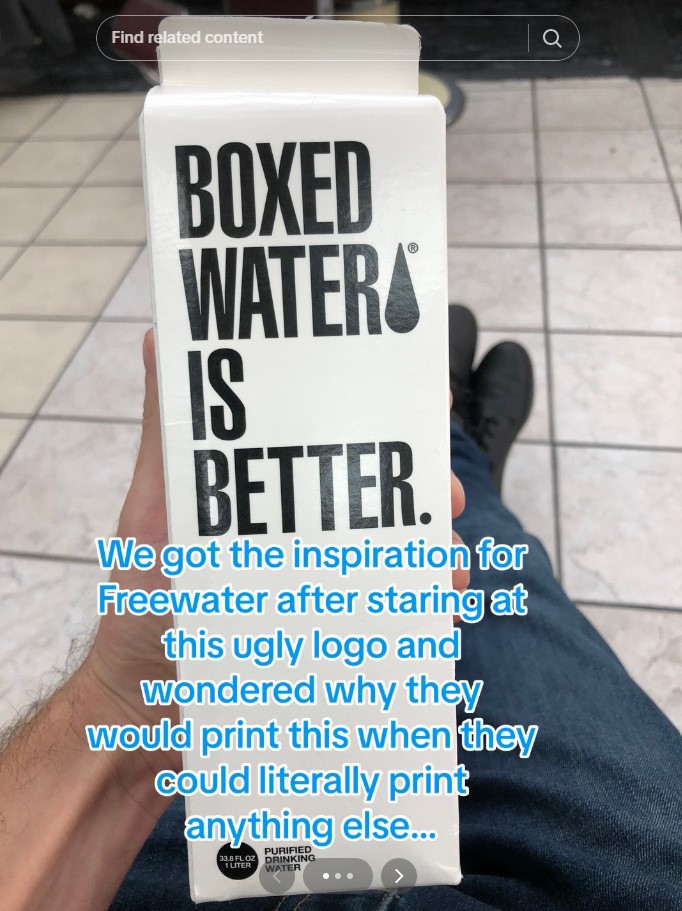“These 24 packs are set to take over the world,” FreeWater CEO/Founder Josh Cliffords explained and he wasn’t bragging, “We believe free water is a basic human right.”
That’s because free water is more than a notable cause. For Josh, it’s serious business. And it’s his crusade to end the worldwide clean water shortage.
But how will giving out free water rid the world of its clean water crisis?
Look no further than Josh’s company slogan to find out, “Put your brand in everyone’s hand.”

Not Everyone’s a Fan
“The cost of advertising has surpassed the cost of consumables such as groceries,” Josh explained with a startling admission, “And I ***** hate ads.”
Right now, ads are Josh’s company’s profit-making strategy.
“There’s a 300% markup on bottled water.”
That’s how the natural spring water in his aluminum bottles & paper cartons is financed. But with every beverage the company gives out, the plot gets thicker. Each bottle FreeWater puts in someone’s hand, donates to two charities.
That’s 10 cents or more to aid charities that construct water wells around the world.
So, FreeWater joins profit with philanthropy! It’s mind boggling how Josh does it. And it took Josh’s calculated journey to get his company on its current mission.

A Negatively-Priced Permanent Vacation
In 2014, transitioning out of the Army, Josh struggled. The trauma and stress residues were still fresh from his tour of duty. To combat it, Josh planned on his 30th birthday to set off on a trip around the world. He set up 100 countries to visit in four years on his calendar.
And he was determined to beat his depression and tackle his suicidal thoughts.
“Don’t be that person,” he pumped himself up, “You need to change your environment and turn the page in your life.”
On this self-invested vacay, his taxi was hijacked. Then, he found Uber wasn’t any better. Josh was beyond frustrated. He created a model to price electricity and transportation. And that’s with an emphasis on the negative side of the number line.
Josh discovered that if he got a price as far down as 150%, he’d hit payday. On that negative number line, he would outprice his competition.
But how? He was working up the calculations to nail it, yet it remained a bunch of napkin math on his whiteboard.
Rescue the Refugees
In Rome, Josh heard the stories of some refugees booking it from their own country. He was curious as to why.
“They all shared the same story — no food, no water. I was so struck by these refugee stories that I canceled my trip around the world and initiated a nonprofit called Save the Refugees.”
With his charity, Josh and his soon-to-be wife held out a helping hand to 10,000 people from 26 countries.
“The more people we helped. The more I heard the same story. One in four expressed they lacked any food or water. And that got the hamster wheel turning.”
After 18 months of aid to these refugees, he identified all of them suffered from the same problem. Overwhelmed, Josh took a hiatus. He got married and relaxed in his life enjoying Montenegro on the Mediterranean Sea. Overlooking castles and living in luxury wasn’t a bad life in truth.
Deal or No Deal with Fear and Guilt
One day, walking on the beach, Josh felt a ton of guilt. And fear swallowed him up.
“Here, I was enjoying semi-retirement on a beach, and all those refugees were suffering.”
He knew he had to take action.
“I was like come on Josh, you wanted to be in the Green Beret, why should you be afraid some greedy corporation would end your life?”
Reading about the mysterious death of the Segway inventor confirmed his suspicion. He had to snap out of this paralysis.
So, Josh toured the Tesla museum. Each time he went through the exhibits, he felt that much stronger. Finding out the real story behind Tesla’s demise led him to an insight.
“Tesla was like John Wozniak without Steve Jobs. But what if he had a Steve Jobs? What if the only female Tesla loved wasn’t a pigeon? That would be a completely different story.”
Soon, after much soul searching and pep talks, Josh returned to his whiteboard. Then, staring down his dyslexia, Josh taught himself computer literacy. This was his most fearsome foe.
Back to the Negatively Priced Model’s Drawing Board
Marketing, supply-chain economics, and other economic-related concepts followed this major feat of mastery.
His entire study was a revelation.
Josh all the sudden knew how much money capitalism wasted. And he knew why this economic system seldom met demand.
Josh foresaw with QR codes and augmented reality, he could end that problem. It all came to him as he locked-in on the challenges of free enterprise. And came at it from the negative side of the number line.
He had a theoretical model, but the pitch in layman’s terms was a major missing component.
“How can I convey to people that there is a free lunch? And that the free lunch will pay you to eat it because it’s negatively priced?”
90-100 hours a week became Josh’s normal routine. Still, when his Expo marker dried, he had created an economic system to tie to his negative pricing model. Now, to get investors to buy-in.
Mom Knows Best
Before Josh’s mom passed away, she watched his confidence grow. Yet, she saw Josh’s plan for implementation had one big issue.
“You’re not rich or famous, Josh. No one’s gonna give you a utility company to prove that you can make things negatively priced. And profitable.”
“But a middle-class person can create a company,” his mom suggested, “Prove your economic models and theories with something simple that a middle-class person can do.”
Josh was and is certain.
“That was some of the best advice I got on this whole journey.”

The Shock Value Water Story
Imagine. Entering a convenience store with a bottle of water in hand and having a breakthrough. ‘Herb, epiphany on aisle 3!’
Yet, that’s what happened as Josh tore into the use of ad space on the side of a white carton brand of water. Inspiration struck, and he had a blockbuster idea: sell the ad space on the carton.
Then, he added this idea together with his desire to solve the global clean water crisis. And in a flash, he sealed it up within his negatively priced business model.
FreeWater came to life.
Company for Charity and Profit
FreeWater is a profitable company that gives away part of its profit to a charitable cause. And at the moment, that cause is felt world-wide. Nonprofits, Charity Water and Well Aware, construct clean water wells in locations such as Africa and India.
Ad-sponsored water is only the beginning of Josh’s company’s service. Companies also pay him to give it away for free. And since the ad more than pays for both services, FreeWater is better than free.
“It’s negatively priced by ten cents.”
And that has social media users either blown away in gratitude or riled up for a fight.
Searchlight of Skepticism
Josh has made his water famous by capturing product skepticism on social media. There are those who think Josh is insane to give away water for free. When his friend Oliver ad-libbed as one of those people, FreeWater marketing went viral.
The Crazy European Guy Gets FreeWater, Oliver’s video, racked up 100 million views on social media. As a result, FreeWater’s popularity soared. And ad sponsors crashed Josh’s website in a frenzy to buy their own ad space.
Impact of FreeWater at Present
Josh was quick to show how FreeWater is making a difference abroad. “This family is on their way to a funeral.” Josh said, pulling up a video on his smartphone.
Josh couldn’t hide his appreciation. It was like he was seeing this video for the first time.
“(Look at the) smiles and dancing of this African family celebrating when they saw the water guy was coming.”
An Austin-based news website, in 2022, valued FreeWater at $7 million dollars. But when asked about it, Josh declined.
“Like many other tech startups were on a SAFE note status.” So, on SAFE (Simple Agreement for Future Equity) notes, investors are in for a future share of later profits.
Yet, FreeWater donations have completed two water projects in Kenya with Well Aware. The company has financed six Charity Water projects in India.
And most proudly, Josh has partnered with and advised other world companies. A Pakistan company, that met with Josh, has a second water well project on the agenda.
Impressive also is the names of FreeWater’s client roster. Companies like NBC, NASCAR and Netflix make up examples of their 100 ad-supported clients. But the key to Josh?
This negative-priced economic model has shown to be effective in two capitalistic economies — Pakistan and the US.

Water is His Book of Genesis
Josh sees ad-supported spring water as the first of many products his company will sell/market.
“The negatively priced economic model transfers to many products/services through targeted demand. QR code clicks and augmented reality bring marketing to new efficiencies. Each tells my company the exact amount to make for your preference. That way, the only warehouse for your goods would be your cupboard.”
Taking out the storage middleman of a dusty warehouse makes Josh smile.
“You have an economic revolution.”
Josh’s company envisions a storefront of ad-supported products. It’s a platform where each item can be given away for free due to its paid advertised packaging. He also visualizes consumers who get free items will pick a favorite charity to donate to.
“Imagine 10 cents this time to save the whales, the next helping a battered women’s shelter. Think of all the good we could do.”
With this negatively priced model, possibilities are endless.
“A company could earn more than $1,000 from a single bottle of water or free bag of potatoes and then hit the mission of curing the global water shortage.”
More Napkin Math
“Just 10% of Americans drinking one FreeWater a day could lead to a minimum annual donation of 1.25 billion,” Josh claimed. “Plus, if 1% of Americans eat our first 100 free groceries, we donate the same amount. Giving away this free food could reduce food waste by 33%. That’s the percentage of food thrown out behind your supermarket before it can be sold.”
Josh’s eyes lit up as he thought about a world where your pantry was the only grocery warehouse.
“Think about if the food you got was targeted for you in the physical, the QR coding augmented reality. Made and shipped right to your house in a week.”
And then, he chatted about the true passion behind all his models, our planet. Think about how environmentally friendly an economy like this would be.
“Food would be fresh and delivered locally. That means less drive time. No warehouses. Zero carbon emissions. Trucks with ads on the side would pay for and drive themselves. And everything running on solar energy.”
And Josh was only getting started with the impact he foresaw with this tweak to capitalism.
“So these new methods are what’s going to radically transform the world, you know, in my opinion, and it’s only possible through negatively priced goods.”
Get Involved
When asked about how people can get involved, Josh had a surprising answer.
“Question how we do everything. Ask a lot of questions.”
This is the method of inquiry that helped Josh build his negative pricing model. He’s very humble. And denies his brilliance. He cites he’s curious and driven. So, Josh offers this challenge to all.
“Question everything.”Plus, there are other ways you can continue the impact of FreeWater. Land on the FreeWater website and claim your own 12 or 24-pack of free water — all that’s required is paying for shipping.
Get out there and tell people, politicians, companies about FreeWater and their mission. Finally, you can ask for a pallet of FreeWater to hand out for free at your next big bash for your community.
If you enjoyed this post, let me know what you liked most. You can always join our jeffsyblik.com blog family. And enjoy a smart marketing-related lead generator for free as your welcoming gift. Fill out the pop-up in the website margin.
Until next time, be your top-shelf you.
